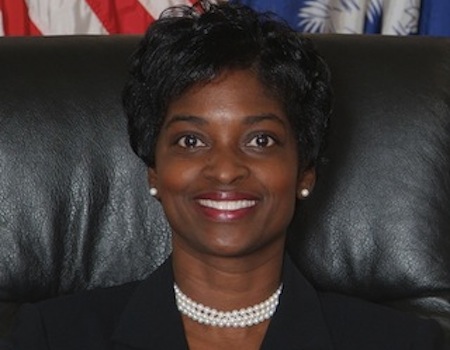Clyburn Defends FCC's Critical Needs Study

The smarter way to stay on top of broadcasting and cable industry. Sign up below
You are now subscribed
Your newsletter sign-up was successful
FCC commissioner and former acting chairwoman Mignon Clyburn defended the FCC's Critical Information Needs study Feb. 26 in a speech at the Media Institute in Washington, saying she would never try to chill speech or influence journalists and that the study was an effort to gauge the market, not shape it.
According to a text of the speech obtained by B&C/Multichannel News, Clyburn told the group that the intent of the study, which was put out for public notice last may when Clyburn was heading the agency, was to "gather data and other information about whether there are any market entry barriers, preventing local communities from receiving important information."
Clyburn noted that the FCC had been the center of attention over that study in the past couple of weeks. That included the suggestion in some quarters that Clyburn was an administration agent of newsroom intrusion or influence in a backdoor attempt to insure news balance akin to the FCC's discredited fairness doctrine.
"As a person who spent 14 years running a small weekly, I would never be a part of any effort to chill speech, shape the news or influence news gatherers," she told her audience of media execs, lawyers and others. "I am about facilitating ownership and opportunities and making sound decisions about our most critical industries based on solid research and not rhetoric."
After Republican FCC commissioner Ajit Pai wrote an op ed in the Wall Street Journal critical of the methodology of the pilot study in Columbia, S.C, which was to include asking journalists what they covered and why, the study issue became a topic of conversation on Fox and CNN—where Pai appeared—at the White House, where press secretary Jay Carney was asked about it, then back at the FCC, where Carney had referred reporters.
Chairman Tom Wheeler first said the study methodology would be changed, then later added that the study would not proceed until changes were made, including that no journalists or media owners would be polled. He also said the study was not an attempt to regulate journalists' speech.
House Republicans, who also queried Wheeler about the study last December, are not yet pacified. House Communications Subcommittee chairman Greg Walden (R-Ore.) this week signaled he planned hearings and even legislation to try and block the study.
The smarter way to stay on top of broadcasting and cable industry. Sign up below
But Clyburn said that undertaking such a study was what Congress directed the FCC to do, and that "understanding the markets that we regulate is necessary, critical and urgent. And in a world where technological change happens at breakneck speed, we have three fundamental choices."
"The Commission can regulate in the dark, without research and critical data; it can do nothing, not act and risk not protecting the public or appropriately balancing the needs of industry, or it can seek a better understanding of the industries it regulates and the environment in which they operate," she said.
Clyburn said she was keeping an open mind about how joint sales and shared services agreements should be treated under FCC rules, but said that arrangements that have been "designed to patently circumvent the ownership rules" are not good for anyone.
The Department of Justice last week weighed in on the topic, saying sharing arrangements may be illegal if they are done simply to get around ownership rules. The FCC is expected to vote on a media ownership item dealing with JSAs, and perhaps SSAs as well, at the March meeting, though that has now been pushed from March 19 to March 31, which could push off circulation of that item.
Clyburn gave a shout out to the Media Institute and its president, Patrick Maines, calling the former "one of Washington’s—and indeed the nation’s—preeminent forums for the full expression of thought, deliberation, debate and dialogue on pressing issues in the media," and the latter as having "elegantly knitted what may appear to most as disparate themes, into one unified message—Freedom of Speech and the First Amendment, are alive and supreme in our nation."
The Media Institute is a First Amendment think tank backed by major media outlets.
Contributing editor John Eggerton has been an editor and/or writer on media regulation, legislation and policy for over four decades, including covering the FCC, FTC, Congress, the major media trade associations, and the federal courts. In addition to Multichannel News and Broadcasting + Cable, his work has appeared in Radio World, TV Technology, TV Fax, This Week in Consumer Electronics, Variety and the Encyclopedia Britannica.

